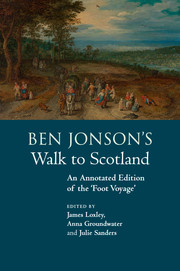Book contents
- Frontmatter
- Contents
- List of illustrations
- Acknowledgements
- A note on names
- Abbreviations
- Introduction: Jonson’s ‘Foot Voyage’ and the Aldersey manuscript
- My gossip Jonson his Foot Voyage and mine into Scotland
- Contextual essays
- 1 The genres of a walk
- 2 Jonson’s foot work
- 3 Scenes of hospitality
- Printed Works cited
- Index
1 - The genres of a walk
from Contextual essays
Published online by Cambridge University Press: 05 December 2014
- Frontmatter
- Contents
- List of illustrations
- Acknowledgements
- A note on names
- Abbreviations
- Introduction: Jonson’s ‘Foot Voyage’ and the Aldersey manuscript
- My gossip Jonson his Foot Voyage and mine into Scotland
- Contextual essays
- 1 The genres of a walk
- 2 Jonson’s foot work
- 3 Scenes of hospitality
- Printed Works cited
- Index
Summary
‘Shifting place and air’
In A Jovial Crew, perhaps his last play, Richard Brome presents an extraordinary picture of a gentleman given, in the strongest possible sense, to travel. Springlove is steward to the ‘ancient esquire’ Oldrents, charged with the responsibility of managing the latter’s substantial estate; when we first meet him he is encumbered with books and papers, ready to present to his master ‘a survey of all your rents / Receiv’d, and all such other payments as / Came to my hands since my last audit’ (1.1.123–5). Yet the efficiency with which he has calculated Oldrents’ income and expenditure is not a function of the pleasure he takes in his work; instead he is keen to complete his duties ten days early, around 25 April, so he can pursue his calling – figured in the play as the stirring song of nightingales and cuckoos, to which Springlove responds with a surge of emotion. He wants to travel, as he has been restrained from doing for the last year and a half – in fact, as he says, he needs to travel, and cannot be reasoned out of this drive:
’Tis the season of the year that calls me.
What moves her notes provokes my disposition
By a more absolute power of nature than
Philosophy can render an accompt for.
(1.1.166–9)
To Oldrents, rooted as he apparently is in his family lands, this is nothing more than a ‘disease of nature’, a ‘running sore’ or ‘gadding humour’, a worryingly pathogenic element in Springlove’s constitution (1.1.156, 175). But for his steward, this disposition is nothing less than the ‘predominant sway of nature…in me’ (1.1.242–3). It cannot be suppressed or denied, however suspect and unnatural it appears to those, like Oldrents, who wish only to cleave to their home country.
- Type
- Chapter
- Information
- Ben Jonson's Walk to ScotlandAn Annotated Edition of the 'Foot Voyage', pp. 109 - 133Publisher: Cambridge University PressPrint publication year: 2014

